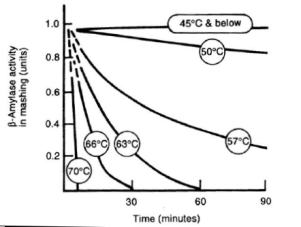- Joined
- 29/1/06
- Messages
- 261
- Reaction score
- 9
The last 3 brews that I've done have all ended up undercooked, and I can't tell why.
OG's are in the 1050-1060 range, quite normal.. all taste on the money pre-ferment.
Using Safale Fermentis yeasts, the first two were pre-started with wort for a 4-5 hours to partially activate the yeast before pitching properly.
The last one was sprinked in while aerating.
I bubble away with an aeration stone for a good 20 minutes after chilling post-boil. I pitch the yeast at about 18C (all 3 were ales).
Fermentation kicks along at 18C for a week, then things slow down. I ferment in a fridgemate-controlled chest freezer.
The previous two made it to 1020.. the american pale ale I did 7 days ago is at 1022 now (OG 1051). I'm using Safale US05 this week.
It's been a cool week, so I'm going to rack it in a day or so, and see how it goes after another week.
However, after brewing for 5 years, I've never had this happen previously. I'm scratching my head. Usually my fermentations are all done within a week to 10 days (for ales).
There shouldn't be many unfermentable sugars in there, the mash was done at 68C.. so not overly warm, so there should've been a good degree of conversion to fermentable sugars. Similar profile really to the last two brews.
After never having this problem, as it's just a bloody simple thing, I can't quite grasp what it might be. Maybe the fridgemate calibration is borked and it's too cold.. hmm.
any ideas?
OG's are in the 1050-1060 range, quite normal.. all taste on the money pre-ferment.
Using Safale Fermentis yeasts, the first two were pre-started with wort for a 4-5 hours to partially activate the yeast before pitching properly.
The last one was sprinked in while aerating.
I bubble away with an aeration stone for a good 20 minutes after chilling post-boil. I pitch the yeast at about 18C (all 3 were ales).
Fermentation kicks along at 18C for a week, then things slow down. I ferment in a fridgemate-controlled chest freezer.
The previous two made it to 1020.. the american pale ale I did 7 days ago is at 1022 now (OG 1051). I'm using Safale US05 this week.
It's been a cool week, so I'm going to rack it in a day or so, and see how it goes after another week.
However, after brewing for 5 years, I've never had this happen previously. I'm scratching my head. Usually my fermentations are all done within a week to 10 days (for ales).
There shouldn't be many unfermentable sugars in there, the mash was done at 68C.. so not overly warm, so there should've been a good degree of conversion to fermentable sugars. Similar profile really to the last two brews.
After never having this problem, as it's just a bloody simple thing, I can't quite grasp what it might be. Maybe the fridgemate calibration is borked and it's too cold.. hmm.
any ideas?





